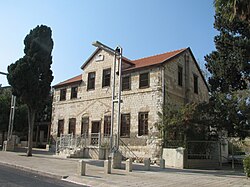

Laurence Oliphant (author)
Quick Facts

Biography
Laurence Oliphant (3 August 1829 – 23 December 1888) was a South African-born British author, traveller, diplomat and Christian mystic. He is best known for his satirical novel Piccadilly (1870). Oliphant was Member of Parliament for Stirling Burghs.
Biography
Laurence Oliphant was born in Cape Town, Cape Colony, the only child of Sir Anthony Oliphant (1793–1859), a member of the Scottish landed gentry and his wife Maria. At the time of his son's birth Sir Anthony was Attorney General of the Cape Colony, but he was soon appointed Chief Justice in Ceylon. Laurence spent his early childhood in Colombo, where his father purchased a home called Alcove in Captains Gardens, subsequently known as Maha Nuge Gardens. Sir Anthony and his son have been credited with bringing tea to Ceylon and growing 30 tea plants brought over from China on the Oliphant Estate in Nuwara Eliya. In 1848 and 1849, he and his parents toured Europe. In 1851, he accompanied Jung Bahadur from Colombo to Nepal, which provided the material for his first book, A Journey to Katmandu (1852). Oliphant returned to Ceylon and from there went to England to study law. Oliphant left his legal studies to travel in Russia. The outcome of that tour was his book The Russian Shores of the Black Sea (1853).
Between 1853 and 1861 Oliphant was secretary to Lord Elgin during the negotiation of the Canada Reciprocity Treaty in Washington, and companion to the Duke of Newcastle on a visit to the Circassian coast during the Crimean War.

In 1861 Oliphant was appointed First Secretary of the British Legation in Japan under Minister Plenipotentiary (later Sir) Rutherford Alcock. He arrived in Edo at the end of June, but on the evening of 5 July a night-time attack was made on the legation by xenophobic ronin. His pistols having been locked in their travelling box, Oliphant rushed out with a hunting whip, and was attacked by a Japanese with a heavy two-handed sword. A beam, invisible in the darkness, interfered with the blows, but Oliphant was severely wounded and sent on board ship to recover. He had to return to England after a visit to Tsushima Island, where he discovered a Russian force occupying a secluded bay and obtained its withdrawal. The attack on the legation left him with permanent damage to one of his hands.
Oliphant returned to England, resigned from the Diplomatic Service and was elected to Parliament in 1865 for Stirling Burghs. While he did not show any conspicuous parliamentary ability, he was made a great success by his novel Piccadilly (1870). He then fell under the influence of the spiritualist prophet Thomas Lake Harris, who in about 1861 had organised a small community, the Brotherhood of the New Life, which was settled in Brocton on Lake Erie, and subsequently moved to Santa Rosa, California.
After having been refused permission to join Harris in 1867, he was eventually allowed to join his community and Oliphant left Parliament in 1868 to follow Harris to Brocton. He lived there for several years engaged in what Harris termed the 'Use', manual labour aimed at forwarding his utopian vision. Members of the community were allowed to return to the outside world from time to time to earn money for the community. After three years Oliphant worked as correspondent for The Times during the Franco-German War, and afterwards spent several years in Paris in the service of the paper. There he met, through his mother, his future wife, Alice le Strange. They married at St George's, Hanover Square, London, on 8 June 1872. In 1873 Oliphant went back to Brocton with his wife and mother.
Later he and his mother had a falling out with Harris and demanded their money (allegedly mainly derived from the sale of Lady Maris Oliphant's jewels) back. This forced Harris to sell the Brocton colony and his remaining disciples moved to their new colony in Santa Rosa, California.
In 1879, Oliphant left for Palestine, where he hoped to promote Jewish agricultural settlement. Later, he saw these settlements as a means of alleviating Jewish suffering in Eastern Europe. He visited Constantinople in the hopes of obtaining a lease on the northern half of the Holy Land and settling large numbers of Jews there (this was prior to the first wave of Jewish settlement by Zionists in 1882). He did not see this as an impossible task in view of the large numbers of Christian believers in the United States and England who supported this plan. With financial support from Christadelphians and others in Britain, Oliphant amassed sufficient funding to purchase land and settle Jewish refugees in the Galilee.

Oliphant and his wife, Alice, settled in Palestine, dividing their time between a house in the German Colony in Haifa, and another in the Druze village of Daliyat al-Karmel on Mount Carmel. Oliphant's secretary Naftali Herz Imber, author of the Israeli national anthem, Hatikva, lived with them.
In 1883, Oliphant wrote Altiora Peto. In 1884, he and his wife collaborated on Sympneumata: Evolutionary Forces Now Active in Man together. The following year, Oliphant wrote a novel, Masollam.
In December 1885, Oliphant's wife became ill and died on 2 January 1886. Oliphant, also stricken, was too weak to attend her funeral. He was persuaded that after death he was in much closer contact with her than when she was still alive, and believed that she inspired him to write Scientific Religion. In November 1887, Oliphant went to England to publish the book.

In 1888, he traveled to the United States and married his second wife, Rosamond, a granddaughter of Robert Owen in Malvern. The couple planned to return to Haifa, but Oliphant took sick at York House, Twickenham, and died there on 23 December 1888. His obituary in The Times said of him, "Seldom has there been a more romantic or amply filled career; never, perhaps, a stranger or more apparently contradictory personality."
 Leo
Leo